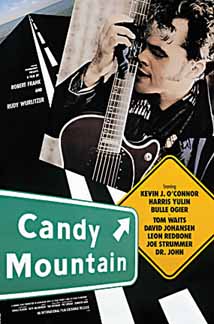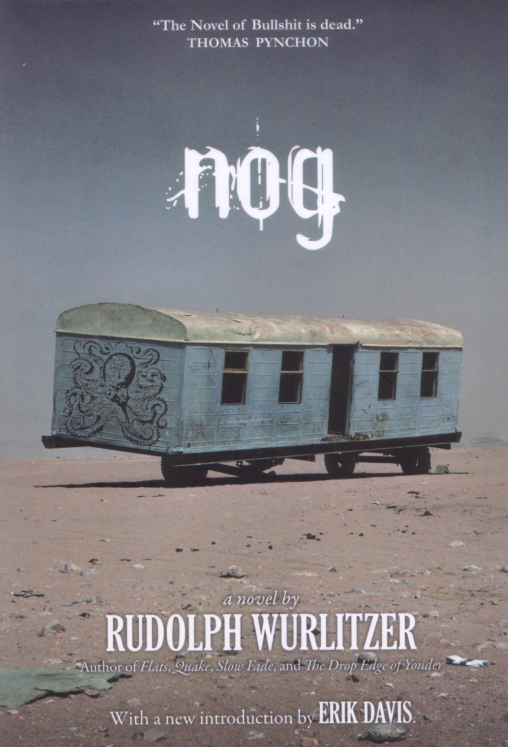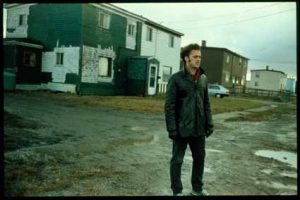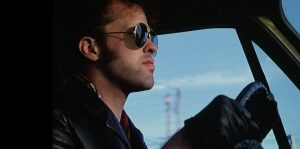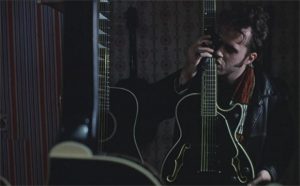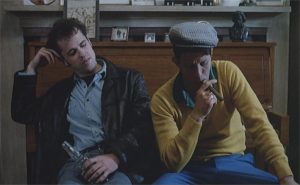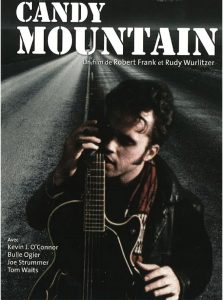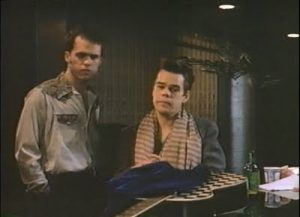From the August 11, 1988 Chicago Reader. — J.R.
CANDY MOUNTAIN
*** (A must-see)
Directed by Robert Frank and Rudy Wurlitzer
Written by Wurlitzer
With Kevin J. O’Connor, Harris Yulin, Tom Waits, Bulle Ogier, Roberts Blossom, Leon Redbone, and Dr. John.
Is it my imagination, or has “60s” become less of a dirty word lately? Appearances can be deceptive, but in recent movies as diverse in quality (as well as in subject matter) as Who Framed Roger Rabbit, Young Guns, and Tucker, we seem finally to be acknowledging that certain 60s values persist in our minds and habits as something more positive than war wounds. The recognition comes slowly and begrudgingly, though — almost as if the Reagan era has kept it under lock and key, and plastered it over with warnings about freak-outs, burnouts, and death. So when something that might be called 60s wisdom makes an appearance in our midst, it deserves to be treasured and savored rather than hastily filed away. At some time in the future we may find uses for it.
Although it’s pointedly set in the present, Candy Mountain has so many links to the 60s in terms of its ambience and attitudes that it seems to exist in a slightly blissed-out time warp — a charmed and charming “other place” that perceives the harshness of the present through a warm and misty (though not necessarily self-deceiving) haze. A likable road movie (which is itself mainly a 60s genre) directed by Rudy Wurlitzer and Robert Frank, two talented figures who are largely associated with that period — especially if we define the 60s as the counterculture era stretching from the late 50s through the early 70s rather than as a literal decade — it harks back to a culture that is more oral than visual, and therefore closer to the previous works of Wurlitzer, a writer, than those of Frank, a photographer and filmmaker.
What I mean here by an oral culture is a less technologically determined world in which information travels mainly by word of mouth and through the wayward channels of rumor, memory, and hearsay rather than through the more direct and impersonal linkups of TV and other media — a culture ordered by legends more than by platitudes, patter, or alleged certainties. The hapless hero of the film, Julius Book (Kevin J. O’Connor), makes a journey north from New York into the remote Canadian wilderness in search of a legendary guitar maker named Elmore Silk (Harris Yulin), at the request of and subsidized by some music entrepreneurs who want Silk to resume his craft. Book’s journey is a trip backward in time as well as forward, and every stage in the voyage is informed by evocations of other times and places.
Significantly, Book’s main vehicles in these parallel trajectories toward the future and the past are a series of cars, vans, and trucks and a single cassette recorder bearing messages from Silk’s former associates in New York. As Book travels north, he encounters various discarded friends, lovers, and relatives of Silk, who record their own messages for him. Book also records his own ruminations, fantasy projections, and bulletins of his progress on the same cassette, and in a way this collection of voices represents the culture that Silk fled. But the different voices are also a series of stepping stones that mark Book’s journey, leading him (as well as us) to the elusive Silk. When Silk eventually plays the tape back, the parallel portraits of his gradual retreat into the wilderness and the reasons for that retreat are equally evident, and comparably complete.
The collaboration between Frank and Wurlitzer as directors was reportedly a difficult one, and certain scenes in the film do have a tentative and/or rough-hewn quality, but the overall flow of the film is relaxed and amiable, the overall tone wry and humorous. As suggested above, the film seems controlled more by the viewpoint of Wurlitzer than by that of Frank.
The Swiss-born Robert Frank has been making films in this country for nearly three decades, and has had a distinguished career as a still photographer since the 50s, but it’s hard to think of an important American independent filmmaker who has had as marginal a reputation in this country as he has. His first film, Pull My Daisy (1959), attracted a lot of attention as a showcase for beat writers — Allen Ginsberg, Peter Orlovsky, and Gregory Corso all appeared in it as actors (along with Delphine Seyrig in her first screen role), and Jack Kerouac improvised the jazzy narration. But the features that followed, The Sin of Jesus (1961) and Me and My Brother (1964), received limited notice, and the nine films of varying lengths made between them and Candy Mountain have probably gotten even less exposure. (Only Cocksucker Blues — a 1972 documentary commissioned and subsequently suppressed by the Rolling Stones — has managed to acquire a reputation through its sporadic screenings.)
On the basis of my own minimal acquaintance with Frank’s work, I would describe him as an independent who has remained marginal by inclination as well as through his interest in marginal subjects (the 1981 short Energy and How to Get It was made in collaboration with William Burroughs as well as Wurlitzer) — although he has served as a mentor to younger and more mainstream artists, Jim Jarmusch and Wurlitzer among them. In Cahiers du Cinéma, Jean-Paul Fargier has compared Frank’s camera style to action painting, implying that he shoots first and asks questions later, though it’s worth pointing out that Pio Corradi handled the cinematography on Candy Mountain, and it’s much more prosaic and conventional than what one usually expects from Frank.
Wurlitzer’s period in the public eye lasted a little longer than Frank’s, mainly through the acclaim that greeted his first novel, Nog (1969), his subsequent scripts for Monte Hellman’s Two-Lane Blacktop (1971) and Sam Peckinpah’s Pat Garrett and Billy the Kid (1973), both of which were published, and the appearance of part of his third novel, Quake, in Rolling Stone during the same period. Less known, but equally deserving of notice, are two other novels, Flats (1970) and Slow Fade (1984), uncredited script work for Coming Home (1978), and the script for Alex Cox’s recent Walker; he is currently writing a script for Volker Schlondorff.
Despite Wurlitzer’s experience as a screenwriter, his orientation remains more literary than cinematic, and his spiritual stomping ground remains the 60s. According to Richard Poirier in The Performing Self, Nog “makes the first serious effort since [Thomas] Pynchon to create a style that renders states of being in which separate identities can barely be located and, when they are, seem merely accidental. Identities fuse and separate without intention and without feeling, as if persons had the consistency of air, with no one able to find himself in himself, in anyone else or, with any certainty, even in space. For Wurlitzer to have created a stylistic approximation of these conditions is an accomplishment of some historic consequence, showing that our language can manage to reach into those areas of contemporary life where, among its young inhabitants, there is mostly silence.”
It wasn’t until I transcribed the above passage that I realized just how dated it might seem today, and how such preoccupations may register as so much mumbo jumbo to a good many contemporary readers. But what Poirier is referring to, which has significant links with both collectivized forms of thinking and hallucinogenic drug experiences, is still a pertinent part of our culture, which eight years of Reagan have obscured more than erased, and Wurlitzer remains one of our sharpest guides to the nuances of this kind of thought. The “historic consequence” of this sensibility is that, in contrast to much of current ideology, it is itself historically grounded, and one of the major achievements of Candy Mountain is its sense of history — not merely its historical grasp of the past two decades, but its sense of a larger history of North America that stretches all the way from the earliest white settlers to the present moment.
Wurlitzer’s personal links to Candy Mountain as a screenwriter should also be noted: his father was a violin maker, and his name is the same Wurlitzer that we associate with organs and jukeboxes. But the world of Candy Mountain is far from the world we associate with big business and its principal means of communication, TV and advertising. Capitalism may be the presiding subtext and the motivating agent that sends Book out on his quest, but the exchanges that mark his progress toward Silk, apart from the $2,000 he is advanced for expenses (with the promise of another $1,000 if he strikes a deal with Silk that yields more guitars), are predominantly and increasingly barter arrangements.
Even before Julius Book agrees to search for Silk, his dealings with the world are partially precapitalistic. In the opening scene, he walks off a job as a carpenter in a lush Manhattan skyscraper in order to reclaim his bass guitar from a musician (Joe Strummer of the Clash) using it to rehearse in a crumbling abandoned building. (As he passes between the economic extremes represented by these two buildings, he is delighted to encounter a high-class doorman eating a banana, which seems to echo his own newly acquired freedom.) The guitar player is dressed in a police uniform, and he is rehearsing with a drummer who is beating his sticks against a hat rack — two indications that we are already entering a surreal, punkish world where the usual social codes and functions no longer apply. The guitarist brandishes a gun and refuses to part with the instrument, but then an exchange is offered: “You give us the guitar and we’ll give you a job.” The job is a music gig that pays nothing, but Book accepts the deal anyway.
Book is clearly a greenhorn in more ways than one. (Kevin J. O’Connor seems to specialize in such parts; he was the beat poet in Peggy Sue Got Married and the callow Ernest Hemingway in The Moderns.) The leader of the blues band he rehearses with (David Johansen) chastises him for his amateurish playing, and when the name Elmore Silk comes up, Book draws a blank. After being told that Silk is the best acoustic-guitar maker in the world, and “that’s like being a baseball player and not knowing who Willie Mays is,” blustering Book gets confused and later assumes that Mays played football.
Throughout the plot, in fact, Book stumbles along like a kind of punk Candide (or one of the songwriters in Ishtar): striking a bargain with the bandleader and his associates to track down Silk, Book sets off, dreaming of completing all his own songs and making it with his own band, convinced that all he needs is an “edge,” which Silk’s signature on a contract will somehow clinch for him. More a receptacle of ideas than a character in his own right — a Book that has been written by others (just as the cassette recorder he carries mainly bears the messages of others) — Julius goes off in search of a more precious and elusive commodity, Silk.
The first things he loses on his journey are his girlfriend and his car; fed up with having supported him and his foolishness, she abandons him on the highway. He’s offered a lift by a sympathetic van driver who advises him, “Life ain’t no candy mountain. . . . In this country, a man without wheels is only half a man.” He takes Book straight to the door of his initial destination, the home of Silk’s nouveau riche brother Al (Tom Waits), but then demands $50 for the ride — an early indication that no one in Book’s travels will ever offer him anything for nothing.
Book spends the night drinking with tacky Al Silk, who glories in his wealth. (“There are rooms in that house I’ve never been in,” he notes from his backyard. “Think about it.”) The next day, he offers to point Book “in the right direction” toward his brother Elmore — six hours away, near Niagara Falls, where Elmore’s daughter lives — if Book agrees to buy Al’s Thunderbird for $1,000; Al’s two parting pieces of advice are, “Take the brake off” and “Don’t flaunt it.” Driving north, Book tapes an imaginary interview with himself as a rock star on the cassette recorder, and when he plays it back, it sounds like an actual radio broadcast — a brief moment of fantasy that’s perhaps the only appearance of “media” in the film.
Book’s next stop — the trailer where Silk’s grown daughter (Laurie Metcalf) lives with her husband, an out-of-work musician in a wheelchair (Dr. John), and their little girl — returns him to harsh reality: the musician kicked out Silk long ago, and he and his wife fight constantly (both contribute messages to Silk on Book’s cassette, each one heaping scorn and abuse on the other). Finally, to spite her husband, the wife offers Book an address she has for Silk in Canada if he agrees to exchange his T-bird for her Volkswagen. (Meanwhile, the little girl offers her own message on the cassette: “Hi, Grandpa. They’re at it again. Please come home.”)
The VW breaks down almost immediately, and Book winds up handing it over to a mechanic, along with $175, for a green pickup truck; he crosses the Canadian border, drives all day through wintry landscapes, and while drinking at the wheel at night, drives off the road and runs into a boat. The boat’s owners, an ornery local constable (Leon Redbone) and his even more eccentric father (Roberts Blossom) — both of them folk musicians who alternately criticize and indulge each other’s craziness — lock him up until Book hands over his remaining $100 and truck. This gradual loss of money and property forms an ironic and absurdist counterpoint to the voluntary abdication of wealth and power implied by Silk’s much earlier trajectory north into the same wilderness, Silk giving up precisely the things that Book hopes to gain by finding him.
The next barter exchange encountered by Book in his fool’s progress, more subtly arrived at, is with Cornelia (Bulle Ogier), a Frenchwoman who is a former lover of Silk and who is caring for her dying mother in a rural cottage; in return for sharing Cornelia’s bed and performing music for her hard-of-hearing mother, Book is fed and gets further information about Silk (“Elmore wants to step off the edge of the map”), including his present address. He next travels to the nearest town by school bus, then hitches a ride with a female loner who agrees to take him wherever he’s going if he first helps her to “jack a deer,” which leads to another night and episode before he finally arrives at Silk’s house. There he encounters a woman leaving the house; she tells him that she doesn’t know or care when Elmore will return, but that Book can wait for him there if he likes. Echoing both her anger and all of Book’s previous barter arrangements is a message written in blue paint over a mirror in the living room: “You owe me one.”
One reason for recounting this much of the movie’s rambling plot (which is far from everything that happens to Book on the road) is to give some notion of its oddball humor, principles of economy, and overall shaggy-dog rhythm. As in “Heart of Darkness,” the eventual appearance of the unseen legend is at once an elucidation and an anticlimax (and Harris Yulin as Silk works both sides of this paradox rather effectively). Book learns that Silk couldn’t care less about his proposal — “Sonny, you’re not even on the board, not even at the tail end of my dance card” — and what we learn about Silk in the present, while full of further paradox, only illustrates and amplifies the abdication of patriarchal power that has informed our understanding of him from the beginning.
It is largely this notion of deliberately relinquishing power that makes Candy Mountain so much of a 60s statement addressed to the present. The loss and/or fusion of identities found by Poirier in Wurlitzer’s first novel, and the lure exerted by the (real or metaphorical) wilderness in all of Wurlitzer’s fiction, are part of the same metaphysics, which may owe as much to Beckett on a literary level as it does to the counterculture on a spiritual level. One reason the 60s may currently seem so remote is that any such rejection of power is inimical to the values and processes of TV, which thrives on power and conflict; what’s mainly known — or at least acknowledged about the 60s today is what survives of it on TV, and little of this has anything to do with giving up power as a moral, ethical, and philosophical position.
This also helps to explain why TV is absent from a film that is as centrally focused on contemporary culture as Candy Mountain is, and why the cassette recorder essentially takes its place as a bearer of news. It would be foolish to call the oral and musical culture that runs through the film like a warm river pretelevision or even antitelevision. Maybe a better way of putting it, to match the folksy vernacular of the movie, would be to say that television is as irrelevant to this particular culture as Julius Book is to Elmore Silk, or capitalism is to barter, or business is to art. And by reminding us of this still-existing culture, Candy Mountain is performing a valuable service as well as charming and entertaining us. It reminds us that legends still exist in the same world as the media that seek either to deny them or to domesticate them, and that once we start to look less at the media and more at the legends, interesting things start to happen. (As Gertrude Stein once put it, in a different era and context: “The great thing about not going to movies is that you get lots of surprises.”)


